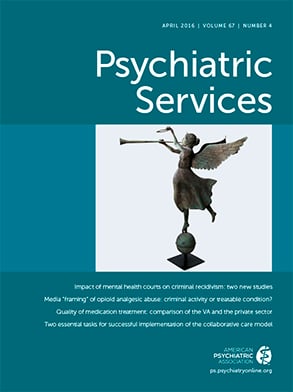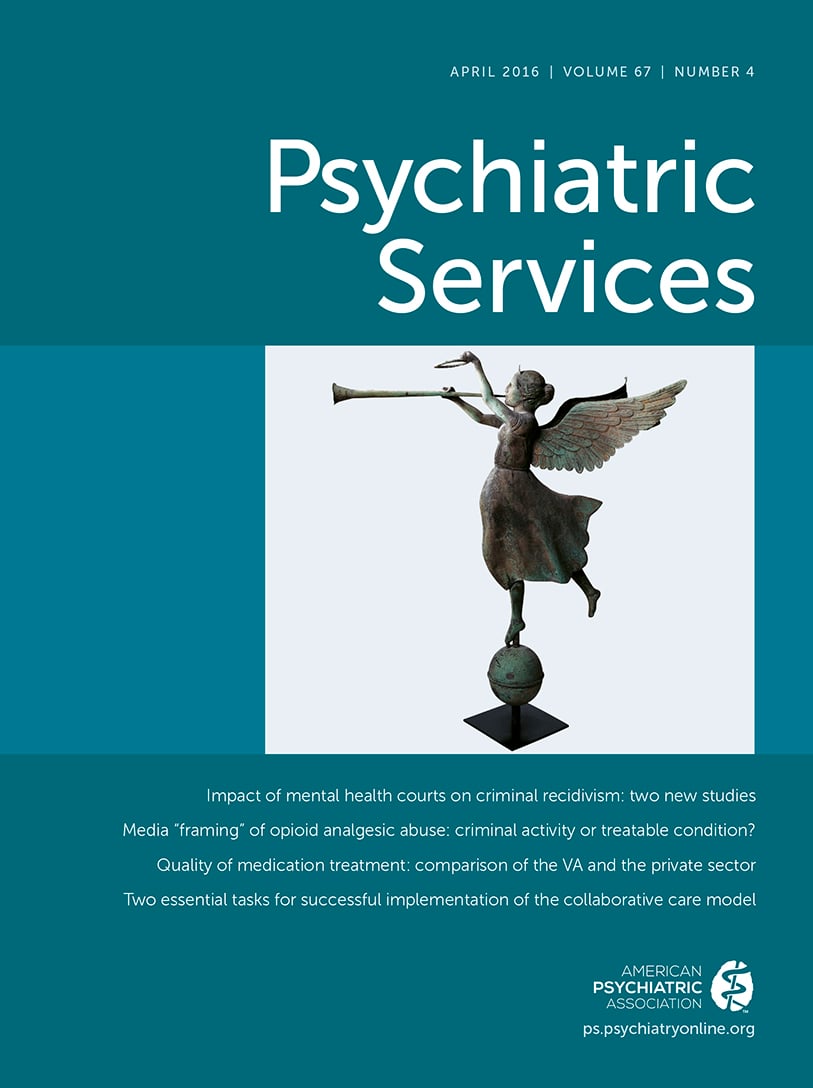Despite advances in schizophrenia treatment, symptom relapses and rehospitalizations impede recovery for many people and are the principal driver of the high cost of care (
1). Relapse prevention planning, cognitive-behavioral therapy for psychosis (CBTp), family psychoeducation, and pharmacotherapy are evidence-based approaches to treating schizophrenia that reduce symptoms, distress, relapses, and hospitalizations. However, most of these services are not available in outpatient mental health treatment settings, leaving people vulnerable to relapse in the period immediately following a hospitalization. More cost-effective interventions are needed to improve access to effective treatments that can prevent relapses and hospitalizations, as well as their disruptive effects on people’s lives.
Technology-delivered or technology-enhanced treatment allows more accessible, convenient, and flexible delivery of evidence-based treatments in the home and community and can function as a clinician extender, enabling more treatment with less clinician time. Furthermore, by facilitating people’s use of relapse prevention strategies, such interventions may prevent costly hospitalizations. Individuals may vary in their preferences for or response to various interventions; thus access to multiple types of interventions could optimize outcomes.
We developed a novel, multicomponent, technology-based approach to relapse prevention. The six-month Health Technology Program (HTP) provides in-person, individualized relapse prevention planning that directs use of technology-based treatments delivered on smartphones and computers and provides a Web-based prescriber decision support program. Interventions are delivered within extensively tested, user-friendly interfaces. A trained case manager guides the individual through the program, provides coaching, monitors the individual, and works in tandem with a psychiatric prescriber. HTP is designed for delivery in outpatient community mental health settings that provide services to people with schizophrenia.
Below we describe the rationale and approach for the HTP relapse prevention program and each component. We then discuss the potential benefits and pitfalls of technology-facilitated treatment and the need for further research.
Technology-Enhanced Relapse Prevention
A strong body of evidence supports the effectiveness of relapse prevention planning for people with schizophrenia (
2). In HTP, the case manager works with the client to develop and implement a personalized relapse prevention plan built on the stress-vulnerability coping model (
3). Relapse prevention skills are taught by the case manager, supported by smartphone- and computer-based treatments, and coordinated with the prescriber and tailored pharmacological treatment. The case manager and client collaboratively develop a personal plan by exploring reasons for preventing relapses; reviewing the last relapse; identifying early warning signs, triggers, and preventive strategies; making a plan to monitor and respond to early warning signs; identifying specific coping strategies; and seeking input from natural supports (for example, family). A brief manual and worksheets support the process of creating, learning, and sharing the plan with other service providers and supportive persons, as well as using the plan to guide deployment of technology-based treatments.
The HTP program has three phases that are individualized on the basis of the person’s symptoms and preferences. In phase 1 (one to two months), the case manager and client develop the plan. Clients are linked with the prescriber for medication and offered the FOCUS smartphone intervention with medication adherence support and one or two of five other coping modules on the basis of their symptoms and early warning signs. Clients who have regular contact with family or other supportive people decide whether to involve them in their plan and whether to use the family psychoeducation-based tool (see below).
In phase 2 (two to three months), the relapse prevention plan is implemented with use of additional technology-delivered family psychoeducation, CBTp, and reminders and symptom management strategies, as described below. The plan is modified as needed, with the case manager assisting and troubleshooting the use of the technology-based interventions. Use of interventions can change: clients may use one or more tools for a period of time and then switch to different ones. In phase 3 (one to two months), the relapse prevention plan is modified one last time if needed, the case manager helps the client plan his or her transition to usual clinical services, and the use of the technology tools ends.
Smartphone Intervention for Schizophrenia
FOCUS is a smartphone system that was developed in collaboration with clinicians and clients. Its five modules are designed to enhance coping with symptoms, mood, or sleep problems; improve social situations; and encourage medication use (
4). The case manager and client select FOCUS content on the basis of persistent symptoms or sources of stress that increase risk of relapse.
FOCUS uses system-generated audio prompts and on-demand resources (visual aids, photos, and cartoons) and written text to teach evidence-based coping strategies through interactive assessments, exercises, and suggestions that clients can access as they encounter challenges in their daily lives. FOCUS transmits clients’ responses to self-assessments and intervention utilization data to a secure server (for example, daily ratings of clinical status and missed assessments). The case manager views this information on a Web-based dashboard and provides live consultation or technical troubleshooting as needed. Thus FOCUS integrates automated, on-demand, and live support options in one approach. Field testing indicated that FOCUS is feasible, acceptable, and usable and suggested that it reduces symptoms and distress for people with schizophrenia (
5).
Computerized CBTp
There is strong evidence for the effectiveness of CBTp for reducing psychotic and other symptoms in schizophrenia (
6). Two Web-based CBTp skills programs, “Coping With Voices” and “Coping With Paranoia,” incorporate traditional elements of CBTp, including goal setting, psychoeducation, normalization of symptoms, coping strategy enhancement, cognitive restructuring, and home practice. The programs help clients develop strategies to cope with voices and paranoia to prevent symptoms from escalating to a relapse. The programs are interactive and self-paced. They include animated tutorials, exercises, and games; personal symptom and goals tracking; and independent skills practice worksheets. Participants progress through modules, cumulatively building skills. Case managers introduce clients to the programs, link the content to clients’ relapse prevention plans, track their progress through a Web-based dashboard, and provide ongoing support. A pilot study of the “Coping With Voices” program found high levels of engagement, program completion, and satisfaction, as well as symptom reductions, among users (
7).
The Daily Support Website
The Daily Support Website (DSW) uses both Web- and phone-based resources to support illness management and recovery for persons with schizophrenia and their supporters. Based on empirically validated approaches to family psychoeducation (
8), the program provides education about schizophrenia, teaches problem-solving skills, and facilitates social support for clients and their relatives and other supporters to reduce family stress and improve coping in order to prevent relapses. The prototype DSW was developed with extensive user testing to ensure usability and comprehension (
9), and a one-year study demonstrated improved symptoms among users compared with a control group (
10).
The DSW includes Web-based group forums, a library of educational resources, an “ask the expert” service, a “frequently asked questions” library, and a news feed. The forums (one each for clients and supporters and one for both) are facilitated by therapists who promote and emphasize discussions on solving problems, alleviating stress, and increasing social support. The DSW also offers phone resources via encrypted text message or an interactive voice response system. The early-warning-signs resource queries clients regarding signs of relapse and suggests coping strategies. A reminder system provides tailored prompts for medications and cues for events such as medical appointments. HTP case managers utilize the DSW dashboard to create user accounts, designate phone functions, and monitor client usage so that case managers can support their use of the tool.
Prescriber Decision Support System
Pharmacotherapy guidelines recommend monthly meetings between prescribers and clients to prevent symptom relapses related to medication nonadherence or inefficacy. These guidelines were implemented in HTP by using a computerized clinical decision support system with a measurement-based care approach, modeled on a system developed for the RAISE-ETP study (Recovery After an Initial Schizophrenia Episode Early Treatment Program), which was funded by the National Institute of Mental Health (
11). All HTP prescribers and clients accessed the program from a secure Web site. Prior to each prescriber visit, the client enters information into the system by answering a series of simple questions about symptoms, side effects, and treatment preferences. The prescriber then reviews these data, which guide the in-person evaluation session. The system includes recommendations about evidence-based medication strategies that inform joint client-prescriber decision making, as well as suggestions for other HTP interventions (for example, “Coping With Voices” for clients with auditory hallucinations).
Discussion
Given the high burden of poorly managed schizophrenia and the limited resources to treat these individuals, technology-facilitated treatment may be an efficient and accessible alternative to conventional approaches. However, research on the translation of evidence-based treatments for schizophrenia into technology-facilitated interventions—and evaluation of whether they are safe, acceptable, effective, and cost-effective—has made less progress than research on interventions for other mental health conditions, such as depression (
12). Nevertheless, technology has infused people’s daily lives, including those with schizophrenia, as indicated by their high rates of mobile device usage and their interest in using personal technology to facilitate mental health services (
13), which suggests that such approaches may be appealing.
Certain technology program design features may be particularly key for this population. For example, therapist-assisted approaches provide safety assessment and monitoring support for adoption, and they may be more effective than independently used Internet interventions (
12). Thus we chose a case manager–facilitated model for HTP. In addition, to address the concern that technology-facilitated interventions may not be usable by people with schizophrenia (
14), HTP interventions were tailored with unique features for people with cognitive impairments (
15).
Although previous work suggested that single technology–delivered interventions were both acceptable and effective in this group (
5,
7,
10), a case manager–facilitated, multicomponent approach has yet to be evaluated. We are currently evaluating the safety, acceptability, and efficacy of HTP for reducing readmission among outpatients with schizophrenia who have been recently discharged from a hospital. Future reports will describe the research design of this study and describe clinical outcomes, user satisfaction, and cost savings from this new model of technology-facilitated care for people with schizophrenia.

